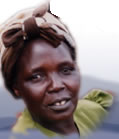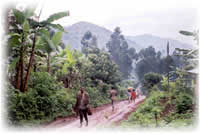 |
 |
||
 |
|||
|
RELATED THEMES agriculture land politics OTHER LOCAL THEMES BACKGROUND |
environment
This spiritual significance, and a recognition of the economic value of the mountain combined with a history of encroachment on their land, has fostered a certain possessiveness as well as respect for the environment: "This is our mountain and it is ours alone....This mountain has a lot of benefits for us. We get our water supply from the mountain. We feel that if this mountain decides to stop giving us water, we will all die. We fear the mountain a lot" (Kenya 20) . Consequently, many feel deep frustration at the state's environmental policies, which include restrictions on forest use and hunting. A government plan to resettle forest dwellers in order to preserve the forest is mentioned several times. And though one narrator (who is a civil servant) agrees that the forest "is not a place for people to build houses and stay", others claim that the forest dwellers have not been adequately compensated, with some still "landless and destitute up to now". A few narrators express suspicion about the government's real motives, alleging that they must be self-serving rather than truly environmental, as the Sabaot have always known how to look after their environment. And one narrator points out that "...if one goes to our forest, the Sabaot are not mining timber, but outsiders are doing it and going away with the timber". (Kenya 11) . quotes about environment"We feel so bad. We are in a pathetic situation. We miss eating the wild meat and yet we can do nothing about it because the government has put tough sanctions on hunting. We feel that if they would be fair to us, they would allow us to go hunting for one month once in a year." "[Some of the resources are] timber and posts for building. Mount Elgon also has caves, which are a source of fertilisers to our farms. If you go to a cave in Mount Elgon, you will see that the dust from them is very rich in phosphorus. So we are proud of the caves, and they also act as shelter for our animals. I would say that the climate in Mount Elgon is quite favourable because we do not have many mosquitoes here. On the positive part, we feel proud to be in Mount Elgon because we are not generally affected by malaria." "What I wanted to mention also about the caves and the mountains, and those unique places, is that the most unique places in Mount Elgon are very specific areas which people adore and worship.. Our people worship God and they have associated some of the places with God. " "You know there was a time when some Sabaot migrated from Chebiuk and went to settle in a forest that they hadn't been given permission to use. They did some farming there but later they were accused for having done that. At the moment, the government is searching for a resettlement place for them. The government wants to preserve the forest and it is not a place for people to build houses and stay. " "In the past, we used to cut down any tree that we required. The government has gazetted this forest (declared it a forest preserve) and has declared that unlicensed felling of trees is not allowed for they are important trees. So we started planting trees, including the Elgon teak." "We respected the forest because we understood that it attracted the rainfall. Sabaot also loved honey and we collected honey from our Mwengeshok that we put in the forest. We were also hunters and the wildlife in the forest was also a source of meat. Another important thing is that the forest provided us with herbal medicine..this made it imperative for everyone to think of preserving the forest. Anybody cutting down trees unnecessarily would be admonished by the community." |
|
 There is much less about the environment in these interviews than in other collections. This may be partly because the interviewers didn't always broach the topic, but it may also reflect the fact that Mount Elgon is a relatively fertile region, and people see their problems less in terms of productivity than in access to markets, credit and other development infrastructure. But this doesn't mean that people take the environment and its clean water, fertile soil and forest resources for granted, or lack powerful feelings about it. Some narrators talk of a strong spiritual attachment to the mountain:
There is much less about the environment in these interviews than in other collections. This may be partly because the interviewers didn't always broach the topic, but it may also reflect the fact that Mount Elgon is a relatively fertile region, and people see their problems less in terms of productivity than in access to markets, credit and other development infrastructure. But this doesn't mean that people take the environment and its clean water, fertile soil and forest resources for granted, or lack powerful feelings about it. Some narrators talk of a strong spiritual attachment to the mountain: